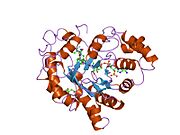AKR1B1
Ensembl | |||||||||
|---|---|---|---|---|---|---|---|---|---|
| UniProt | |||||||||
| RefSeq (mRNA) | |||||||||
| RefSeq (protein) | |||||||||
| Location (UCSC) | Chr 7: 134.44 – 134.46 Mb | Chr 6: 34.28 – 34.29 Mb | |||||||
| PubMed search | [3] | [4] | |||||||
| View/Edit Human | View/Edit Mouse |
Aldo-keto reductase family 1, member B1 (AKR1B1), also known as aldose reductase, is an
ketones to the corresponding alcohol. The involvement of AKR1B1 in oxidative stress diseases, cell signal transduction
, and cell proliferation process endows AKR1B1 with potential as a therapeutic target.
Structure
Gene
The AKR1B1 gene lies on the
exons. There are a few putative pseudogenes for this gene, and one of them has been confirmed and mapped to chromosome 3.[6]
Protein
AKR1B1 consists of 316
dinucleotide binding fold. The way it binds NADPH differs from other nucleotide adenine dinucleotide-dependent enzymes. The active site pocket of human aldose reductase is relatively hydrophobic, lined by seven aromatic and four other non-polar residues.[7]
Function
AR belongs to the aldehyde-keto reductase
steroidogenesis.[9]
Clinical significance
Under diabetic conditions AR converts glucose into sorbitol, which is then converted to fructose. 20466987 It has been found to play an important role in many
diabetes complications such as diabetes retinopathy and renopathy.[10][11][12] It is also involved in many oxidative stress diseases, cell signal transduction, and cell proliferation process including cardiovascular disorders, sepsis, and cancer.[13]
It has been reported that the action of AR contributes to the activation of retinal
endotoxemia and other ROS-induced inflammatory diseases.[12]
Interactions
AKR1B1 has been found to interact with:
- ginsenoside 20(S)-Rh2[15]
- alkaloid[16]
- carboxylic acid derivatives[12]
- spirohydantoins[12]
- cyclic amides[12]
References
- ^ a b c GRCh38: Ensembl release 89: ENSG00000085662 – Ensembl, May 2017
- ^ a b c GRCm38: Ensembl release 89: ENSMUSG00000001642 – Ensembl, May 2017
- ^ "Human PubMed Reference:". National Center for Biotechnology Information, U.S. National Library of Medicine.
- ^ "Mouse PubMed Reference:". National Center for Biotechnology Information, U.S. National Library of Medicine.
- S2CID 34446965.
- ^ a b "Entrez Gene: AKR1B1 aldo-keto reductase family 1, member B1 (aldose reductase)".
- S2CID 39792612.
- PMID 10510318.
- PMID 15181092.
- PMID 24631337.
- PMID 25722213.
- ^ PMID 26349493.
- PMID 25375908.
- PMID 24677107.
- PMID 25152999.
- PMID 24236461.
Further reading
- Borhani DW, Harter TM, Petrash JM (December 1992). "The crystal structure of the aldose reductase.NADPH binary complex". The Journal of Biological Chemistry. 267 (34): 24841–7. PMID 1447221.
- Wilson DK, Bohren KM, Gabbay KH, Quiocho FA (July 1992). "An unlikely sugar substrate site in the 1.65 A structure of the human aldose reductase holoenzyme implicated in diabetic complications". Science. 257 (5066): 81–4. PMID 1621098.
- Graham A, Heath P, Morten JE, Markham AF (March 1991). "The human aldose reductase gene maps to chromosome region 7q35". Human Genetics. 86 (5): 509–14. S2CID 34446965.
- Graham A, Brown L, Hedge PJ, Gammack AJ, Markham AF (April 1991). "Structure of the human aldose reductase gene". The Journal of Biological Chemistry. 266 (11): 6872–7. PMID 1901857.
- Grundmann U, Bohn H, Obermeier R, Amann E (April 1990). "Cloning and prokaryotic expression of a biologically active human placental aldose reductase". DNA and Cell Biology. 9 (3): 149–57. PMID 2111143.
- Nishimura C, Matsuura Y, Kokai Y, Akera T, Carper D, Morjana N, Lyons C, Flynn TG (June 1990). "Cloning and expression of human aldose reductase". The Journal of Biological Chemistry. 265 (17): 9788–92. PMID 2112546.
- Morjana NA, Lyons C, Flynn TG (February 1989). "Aldose reductase from human psoas muscle. Affinity labeling of an active site lysine by pyridoxal 5'-phosphate and pyridoxal 5'-diphospho-5'-adenosine". The Journal of Biological Chemistry. 264 (5): 2912–9. PMID 2492527.
- Bohren KM, Bullock B, Wermuth B, Gabbay KH (June 1989). "The aldo-keto reductase superfamily. cDNAs and deduced amino acid sequences of human aldehyde and aldose reductases". The Journal of Biological Chemistry. 264 (16): 9547–51. PMID 2498333.
- Chung S, LaMendola J (September 1989). "Cloning and sequence determination of human placental aldose reductase gene". The Journal of Biological Chemistry. 264 (25): 14775–7. PMID 2504709.
- Graham A, Hedge PJ, Powell SJ, Riley J, Brown L, Gammack A, Carey F, Markham AF (October 1989). "Nucleotide sequence of cDNA for human aldose reductase". Nucleic Acids Research. 17 (20): 8368. PMID 2510130.
- Akagi Y, Kador PF, Kuwabara T, Kinoshita JH (November 1983). "Aldose reductase localization in human retinal mural cells". Investigative Ophthalmology & Visual Science. 24 (11): 1516–9. PMID 6417042.
- Ko BC, Lam KS, Wat NM, Chung SS (July 1995). "An (A-C)n dinucleotide repeat polymorphic marker at the 5' end of the aldose reductase gene is associated with early-onset diabetic retinopathy in NIDDM patients". Diabetes. 44 (7): 727–32. PMID 7789640.
- Wilson DK, Tarle I, Petrash JM, Quiocho FA (November 1993). "Refined 1.8 A structure of human aldose reductase complexed with the potent inhibitor zopolrestat". Proceedings of the National Academy of Sciences of the United States of America. 90 (21): 9847–51. PMID 8234324.
- Tarle I, Borhani DW, Wilson DK, Quiocho FA, Petrash JM (December 1993). "Probing the active site of human aldose reductase. Site-directed mutagenesis of Asp-43, Tyr-48, Lys-77, and His-110". The Journal of Biological Chemistry. 268 (34): 25687–93. PMID 8245005.
- Robinson B, Hunsaker LA, Stangebye LA, Vander Jagt DL (December 1993). "Aldose and aldehyde reductases from human kidney cortex and medulla". Biochimica et Biophysica Acta (BBA) - Protein Structure and Molecular Enzymology. 1203 (2): 260–6. PMID 8268209.
- Jaquinod M, Potier N, Klarskov K, Reymann JM, Sorokine O, Kieffer S, Barth P, Andriantomanga V, Biellmann JF, Van Dorsselaer A (December 1993). "Sequence of pig lens aldose reductase and electrospray mass spectrometry of non-covalent and covalent complexes". European Journal of Biochemistry. 218 (3): 893–903. PMID 8281941.
- Liu SQ, Bhatnagar A, Ansari NH, Srivastava SK (August 1993). "Identification of the reactive cysteine residue in human placenta aldose reductase". Biochimica et Biophysica Acta (BBA) - Protein Structure and Molecular Enzymology. 1164 (3): 268–72. PMID 8343525.
- Nishimura C, Furue M, Ito T, Omori Y, Tanimoto T (July 1993). "Quantitative determination of human aldose reductase by enzyme-linked immunosorbent assay. Immunoassay of human aldose reductase". Biochemical Pharmacology. 46 (1): 21–8. PMID 8347133.
- Sato S, Lin LR, Reddy VN, Kador PF (August 1993). "Aldose reductase in human retinal pigment epithelial cells". Experimental Eye Research. 57 (2): 235–41. PMID 8405190.
- Ferraretto A, Negri A, Giuliani A, De Grada L, Fuhrman Conti AM, Ronchi S (February 1993). "Aldose reductase is involved in long-term adaptation of EUE cells to hyperosmotic stress". Biochimica et Biophysica Acta (BBA) - Molecular Cell Research. 1175 (3): 283–8. PMID 8435445.
External links
- Human AKR1B1 genome location and AKR1B1 gene details page in the UCSC Genome Browser.
- Human AR genome location and AR gene details page in the UCSC Genome Browser.

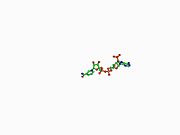

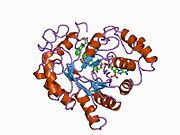










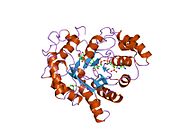

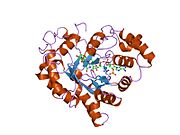
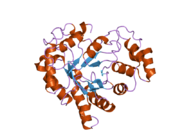




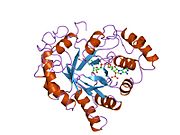







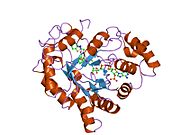




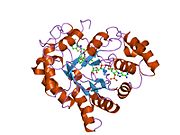






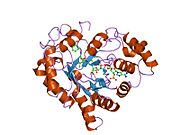
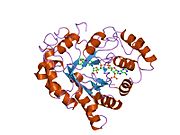
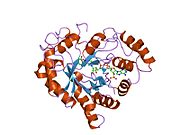
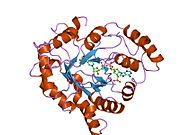

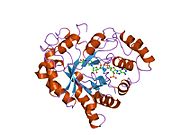

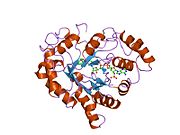
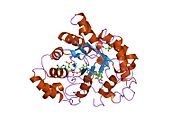
![2nvc: Human Aldose Reductase complexed with novel naphtho[1,2-d]isothiazole acetic acid derivative (3)](http://upload.wikimedia.org/wikipedia/commons/thumb/f/f5/PDB_2nvc_EBI.jpg/180px-PDB_2nvc_EBI.jpg)
![2nvd: Human Aldose Reductase complexed with novel naphtho[1,2-d]isothiazole acetic acid derivative (2)](http://upload.wikimedia.org/wikipedia/commons/thumb/c/c2/PDB_2nvd_EBI.jpg/180px-PDB_2nvd_EBI.jpg)
